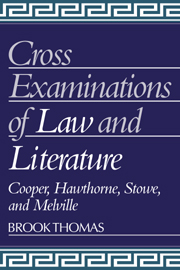Book contents
- Frontmatter
- Contents
- Acknowledgments
- List of abbreviations
- An Opening Statement
- PART I INDIVIDUALS, JUDGES, PROPERTY
- 1 The Pioneers; or the Sources of American Legal History: A Critical Tale
- 2 The House of the Seven Gables: Hawthorne's Legal Story
- 3 The House of the Seven Gables: Hawthorne's Romance of Art
- PART II WAGE AND CHATTEL SLAVERY
- PART III BILLY BUDD AND RE-RIGHTING LEGAL HISTORY
- A Closing Statement
- Notes
- Index
1 - The Pioneers; or the Sources of American Legal History: A Critical Tale
Published online by Cambridge University Press: 08 October 2009
- Frontmatter
- Contents
- Acknowledgments
- List of abbreviations
- An Opening Statement
- PART I INDIVIDUALS, JUDGES, PROPERTY
- 1 The Pioneers; or the Sources of American Legal History: A Critical Tale
- 2 The House of the Seven Gables: Hawthorne's Legal Story
- 3 The House of the Seven Gables: Hawthorne's Romance of Art
- PART II WAGE AND CHATTEL SLAVERY
- PART III BILLY BUDD AND RE-RIGHTING LEGAL HISTORY
- A Closing Statement
- Notes
- Index
Summary
Few would argue with the statement that The Pioneers is a novel about the transformation of America from wilderness to civilization. That transformation, as Henry Nash Smith put it, was “conceived in terms of the antithesis between nature and civilization, between freedom and the law, that has governed most American interpretations of the westward movement”. For Smith, “The narrative turns constantly about the central issue of the old forest freedom versus the new needs of a community which must establish the sovereignty of law over the individual”. George Dekker has refined Smith's definition of the conflict by pointing out that the issue is not simply law versus freedom. Natty's “freedom” results from his obedience to a strict code of law, internalized from his direct experience of nature. In many ways Natty's code is more rigorous than Temple's. Yet Dekker does not really change the terms of the conflict. It remains what Perry Miller called “the great issue of the nineteenth century, the never-ending case of Heart versus Head”. Should Natty's natural sense of justice, personal and from the heart, be sacrificed to a socially imposed rule of law, impersonal and guided by disinterested rationality? “Yes”, Cooper seems to say, even though his heart seems to sympathize with Natty, so much so that he gives America, in Perry Miller's words, “its first universally accepted folk symbol”.
It is not my purpose in this chapter to question the received critical opinion about Cooper's portrayal of the conflict between Natty and the law.
- Type
- Chapter
- Information
- Cross-Examinations of Law and LiteratureCooper, Hawthorne, Stowe, and Melville, pp. 21 - 44Publisher: Cambridge University PressPrint publication year: 1987



